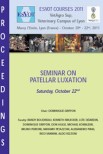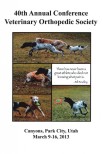Objective: To describe the successful surgical management of a previously unreported Salter-Harris type I fracture of the accessory carpal bone in a dog.
Animal: An 11-week-old intact female Golden Retriever-Poodle cross presented with a history of a marked left forelimb lameness following a suspected fall from a height.
Clinical presentation, progression, and procedures: On physical examination, the patient demonstrated a severe left forelimb lameness and pain on palpation and range of motion of the left carpus. Orthogonal radiographs of the distal left forelimb demonstrated a type I Salter-Harris fracture of the accessory carpal bone with proximal displacement of the palmar fragment.
Treatment and outcome: The patient underwent open reduction and internal fixation wherein the fracture was reduced and stabilized with two 1.1-mm Kirschner wires. Postoperatively, the patient was initially managed with a carpal flexion bandage for 2 weeks and then a soft padded bandage was maintained until 4 weeks postoperatively. The patient recovered well and was walking and weight-bearing comfortably following removal of the carpal flexion bandage. Repeat radiographs performed 4 and 8 weeks postoperatively demonstrated adequate fracture healing but showed mild proximocaudal implant displacement. Implant removal was not performed, as the patient was doing well at home and the implant migration appeared static and was not causing clinical morbidity.
Clinical relevance: To the authors' knowledge, this was the only reported case of a Salter-Harris fracture of the accessory carpal bone in a dog and the only described case of successful surgical stabilization.









